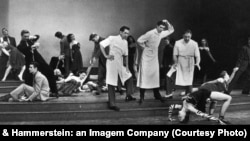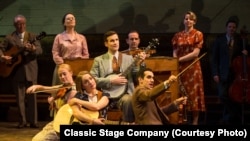Richard Rodgers and Oscar Hammerstein were the writing team that helped usher in what is considered the Golden Age of American musical theater.
By the late 1940s, they had created a string of Broadway hits and were at the top of their game. And then came Allegro. Don’t be surprised if you don’t recognize that title. Allegro was a flop - perhaps, according to one scholar, because its concept and staging made it ahead of its time.
“If you’re reasonably rational and have any objectivity, you know that after you’ve had Oklahoma!, State Fair and Carousel in a row, this is a very good time to be cautious,” composer Richard Rodgers told a radio interviewer in the late fifties. “This is when it’s liable to sneak up from behind and hit you on the back of the head.”
Rodgers and librettist Oscar Hammerstein had pioneered the modern musical format, in which song, story and dance were tightly integrated. In Allegro, they wanted to take those innovations a step further.
“Certainly, in its conception it was epic - conceived of a man from the date of his birth, following him through his youth and into his middle age,” Hammerstein said in 1958. “This boy had started as a country doctor and had then, through an overambitious wife, got mixed up in a kind of society doctor practice and was devoting more time to the social life that goes around medicine, than medicine itself.”
The show was directed and choreographed by the acclaimed Agnes de Mille. It arrived on Broadway with a cast of close to 100 and the biggest advance ticket sales in Broadway history at the time. But reviews were mixed and Allegro only lasted a season.
Witnessing all this was a seventeen year-old production intern: Stephen Sondheim.
“What was interesting was I watched a lot of very knowledgeable people put on a flop,” Sondheim said. “And, by flop, it was a show that didn’t work the way it was intended and it didn’t work partly because it was a highly experimental show.”
The show was highly influential for the fledgling songwriter, who went on to become the voice of his generation, with shows like Sweeney Todd and Sunday in the Park with George.
A faster-paced Allegro
Sondheim told British director John Doyle – with whom he’s collaborated on several shows, including the off-Broadway revival of Passion last season – about Allegro. The director is helming a new staging of the unusual show at the off-Broadway Classic Stage Company.
In reviving the musical, Doyle cut the script down to a single, 90-minute act. He also pared the cast down to 12 actors, all of whom play musical instruments. The streamlined show still focuses on the main themes of Allegro.
“It’s a piece that’s making a message about, I think, about the implications of certain aspects of the American Dream,” said Doyle. “And if you want to follow your dreams, does that have to mean making a lot of money? In a world that values ambition, what does ambition really mean?”
Actor Claybourne Elder plays the protagonist, torn between the trappings of success and making a contribution to society. Elder said the barebones staging of the current revival serves Hammerstein’s words and Rodgers’s music quite well.
“We are doing it in a very modern way, maybe, but we are doing the text that they wrote in the way they wrote it and it’s like that!” said Elder. “The fact that it resonates today with an audience as being edgy and a little bizarre, is pretty incredible.”
And Rodgers and Hammerstein? While they were disappointed with the reaction to Allegro and vowed to rewrite it, they moved on. Their next two shows were South Pacific - which captured a Pulitzer Prize and The King and I - which featured a half-dozen hit songs.













